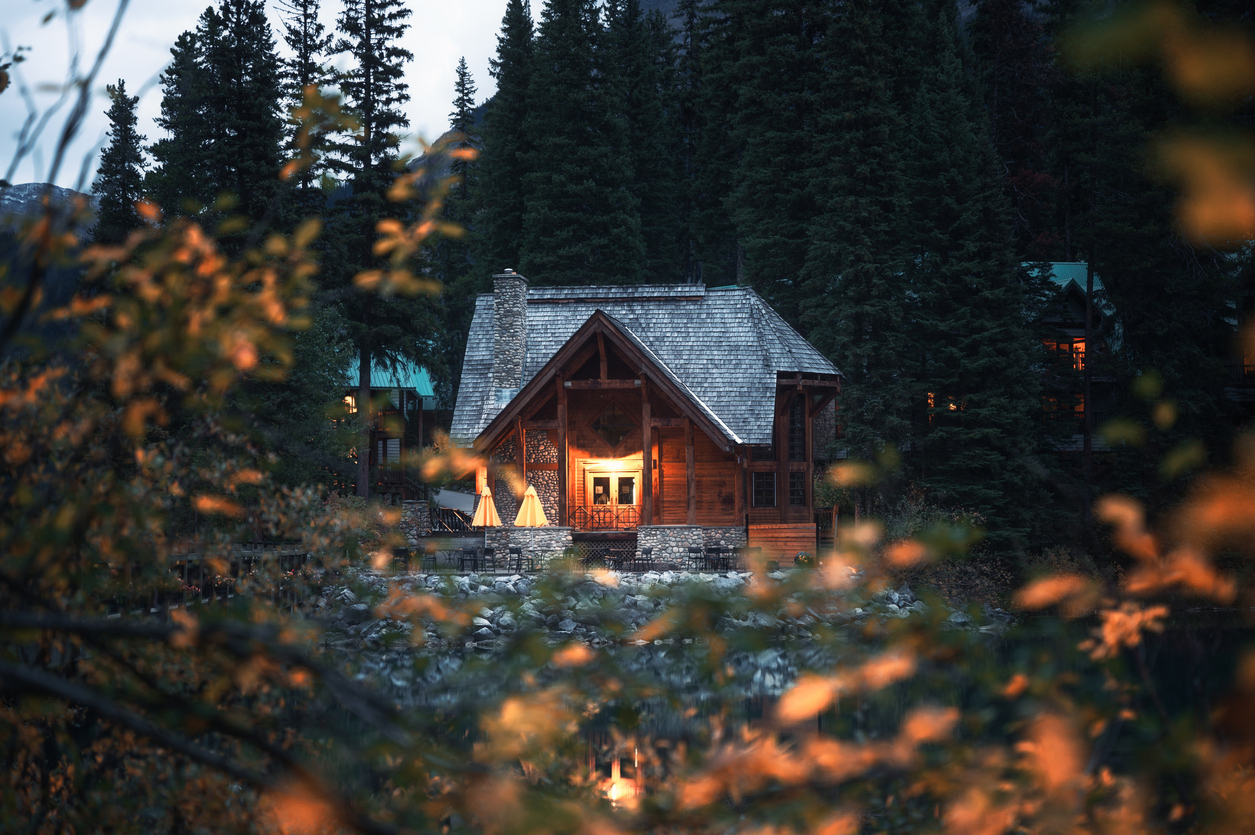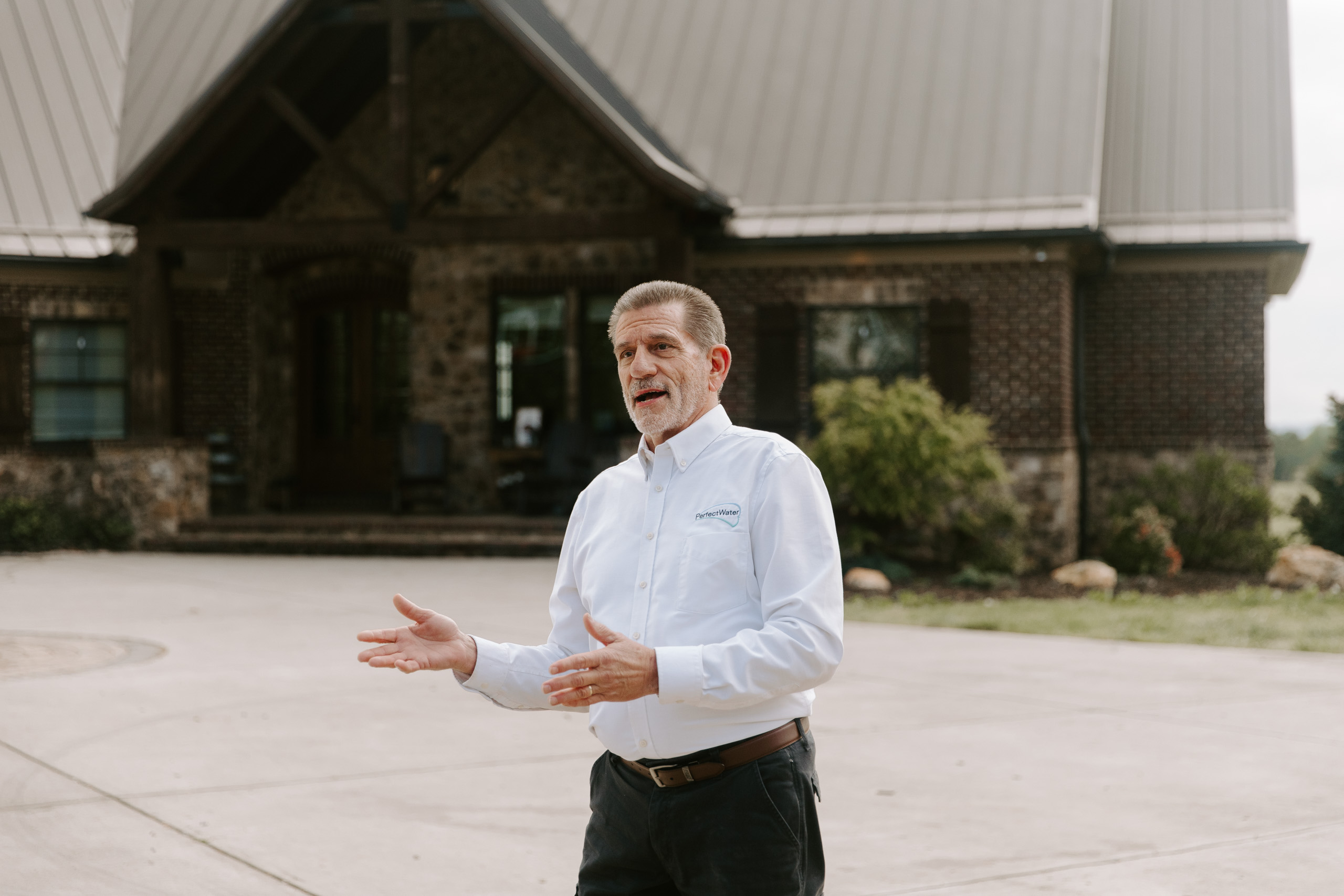Using Rainwater Harvesting for Cabins

If you live in a cabin or have a rental cabin, then you know how important it is to have a safe, reliable water source. However, living off the grid isn’t always easy, and water can be hard to come by — and even when you manage to track down a little water, it can often disappoint with low flow rates or water pressure.
At PerfectWater, we see it all the time: some of our customers have tried to drill multiple wells to serve as a water source for an off-grid cabin, only to come up dry, and still others have spent years struggling to get by with a well that only provided them with 5 to 20 gallons of water a day. We’ve even had customers who have had to resort to hauling water up to their cabins using 250-gallon storage vessels. Yikes!
If only they’d look up once in a while, they might notice that there’s another source of abundant freshwater all around them. That’s right: rainwater harvesting is an all-natural, sustainable alternative to well water, and it can easily be harvested to help you turn your dry off-grid cabin into a fully self-sufficient home.
If you’re looking for a water supply for your cabin, harvesting rainwater is a simple and easy way to ensure that you and your family or renters don’t need to worry about going thirsty again. Keep reading to learn all about rainwater harvesting and why it’s a healthy and eco-friendly choice that’s becoming increasingly popular in the U.S.
How Does Rainwater Harvesting Work?
Rainwater harvesting is a relatively simple process. As soon as rain falls on your cabin roof, which is generally free of harsh contaminants, it is collected and carried underground until it goes through a pre-storage filter, which removes large pieces of debris such as leaves and dirt. The rainwater then enters its above- or below-ground storage tank, the bottom of which is lined with a thin layer of microbiological bacteria called the biofilm. This biofilm keeps the rainwater clean and clear by preventing the formation of odors or slime as it sits over time.
When a resident of your cabin wants a glass of water, all they need to do is turn the tap. Before the rainwater reaches the faucet, it undergoes one final filtration to remove organic contaminants and passes through UV light to remove any bacteria. All that remains is soft, chemical- and contaminant-free rainwater that tastes great and is far better for your skin, hair, and overall health than well water. Use it for drinking and cooking or even washing and bathing — it can be used for any situation that requires water.
What Are the Benefits of Rainwater Harvesting?
Most off-grid cabins rely on well water for their water supply. But rainwater harvesting has many benefits that make it a great alternative to wells, such as:
Water Quality
Is there anything less refreshing than a glass of cloudy, sulfurous water from a nearby well? Even if you have crystal-clear well water now, the chemistry of a well can change dramatically over time as its water comes into contact with different materials, meaning that your water supply could be contaminated with calcium, iron, bacteria, and sediment at any given point in its lifetime.
In contrast, rainwater is free of total dissolved solids (TDS), as well as chemicals and contaminants, making it a high-quality water source that quite literally falls from the sky on a regular basis.
Reliability
It’s often hard to find or drill a water-producing well — and, even if you manage to hit water, there’s no guarantee that it will continue to produce water for years afterwards. If reliability is your concern in selecting a water supply, as it is for many cabin owners, then rainwater is a great option.
When designing a given rainwater harvesting system, we take into account 50- to 100-year rainfall data as well as the size of your cabin and the number of its occupants. When we’re done, you’re left with a long-term water source that’s far more reliable than using a well.
Pressure and Flow Rates
Low water pressure and flow rates can lead to your water slowing to a trickle as it leaves the faucet. That happens because well-based water supplies often need to pump water up hundreds of feet to the surface in order to reach your cabin, which can require the use of a stronger pump or wider pipes.
However, because rainwater storage systems are held at shallower depths or above ground, they don’t need to be rigorously pumped upwards — meaning that you can enjoy high water pressures and flow rates with minimal effort.
Planning for the Future
If you already own an off-grid cabin or rental cabin, chances are that you’re interested in living a sustainable, self-sufficient lifestyle. Rainwater harvesting is the next step in achieving true self-sufficiency in an environmentally friendly way. Not only is rainwater harvesting a good way to equip yourself with a water supply that produces clean, uncontaminated water with very little maintenance or upkeep, but it is also ideal for cabin owners who want to establish their own private water supply over which they have complete control.
If you’re looking for a water supply for your cabin that is far more reliable, clean, and high-quality — not to mention sustainable and eco-friendly — than well water, then look no further than rainwater harvesting. It’s guaranteed to provide you with a renewable source of fresh water, no matter what the future brings.
Key Takeaway
Rainwater harvesting is a perfect way to provide a water supply for cabins. Once it’s installed, a rainwater harvesting system is a self-sufficient system that gathers, purifies, and stores fresh, all-natural rainwater on its own. Not only is rainwater more reliable than well water, but it’s also free of chemicals and contaminants, making it a healthy choice for those who want to provide their off-grid cabin with water in a sustainable and eco-friendly way.
If you’re interested in learning more, take a look at our rainwater harvesting guide, and don’t hesitate to contact us to schedule a water consultation for your cabin. We’re looking forward to helping you take control of your water.
Ready to Take Control of Your Water Supply?
Don’t wait for water shortages or unreliable sources to disrupt your life. With our Rainwater Harvesting systems, you can enjoy a sustainable, reliable, and completely self-sufficient water solution tailored to your home’s needs.

